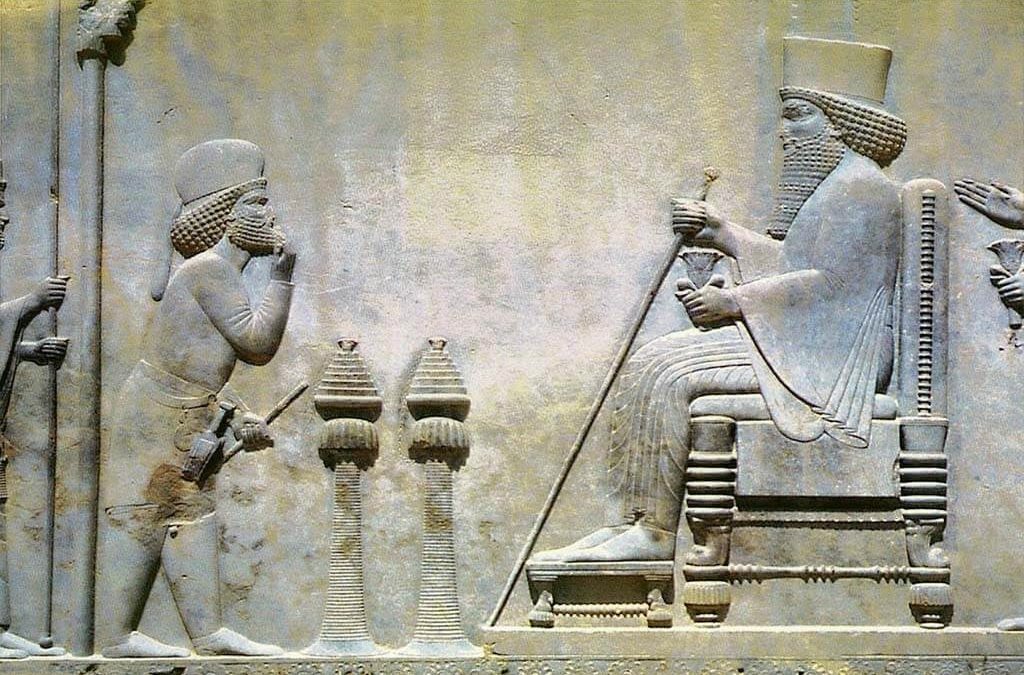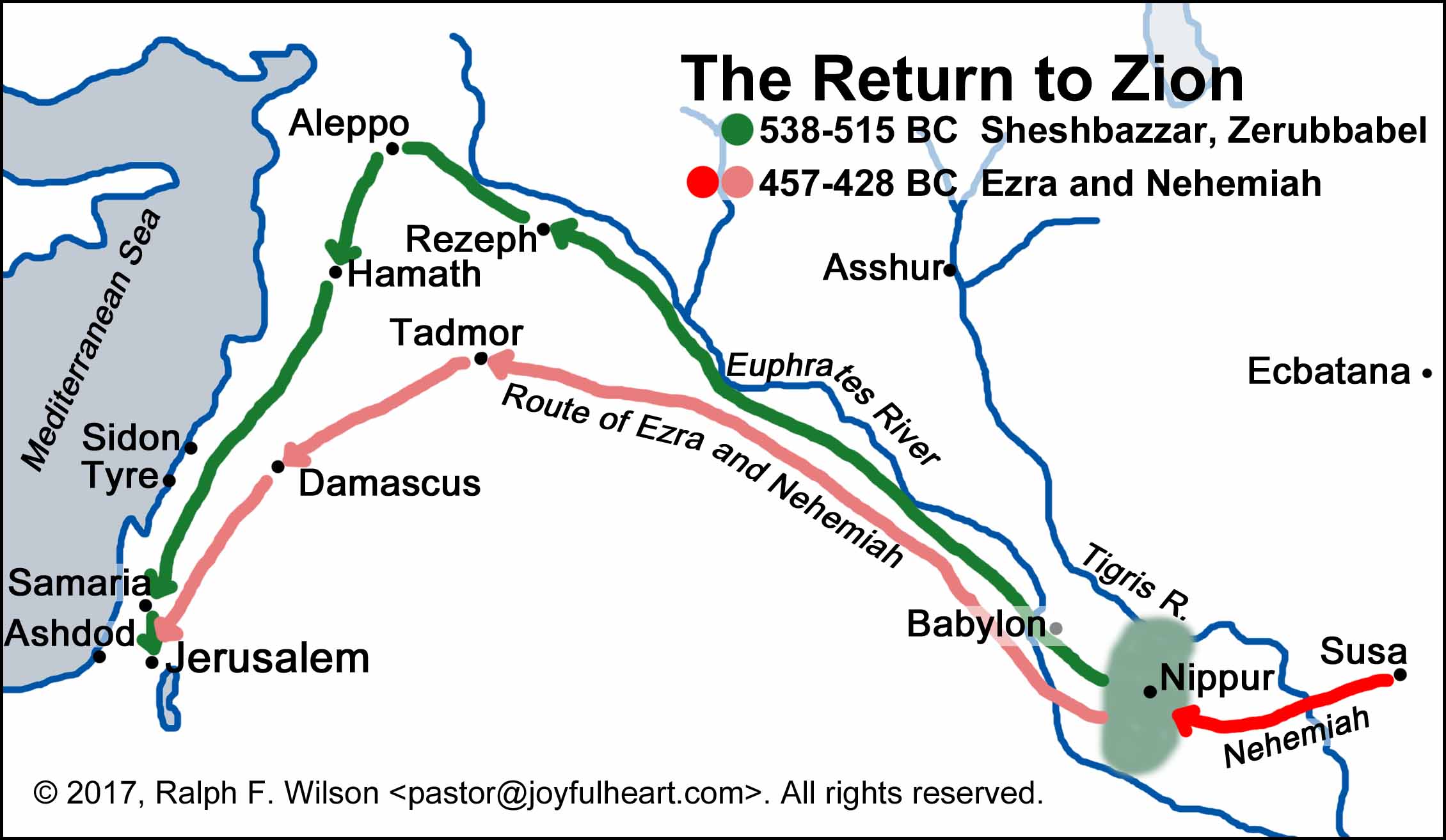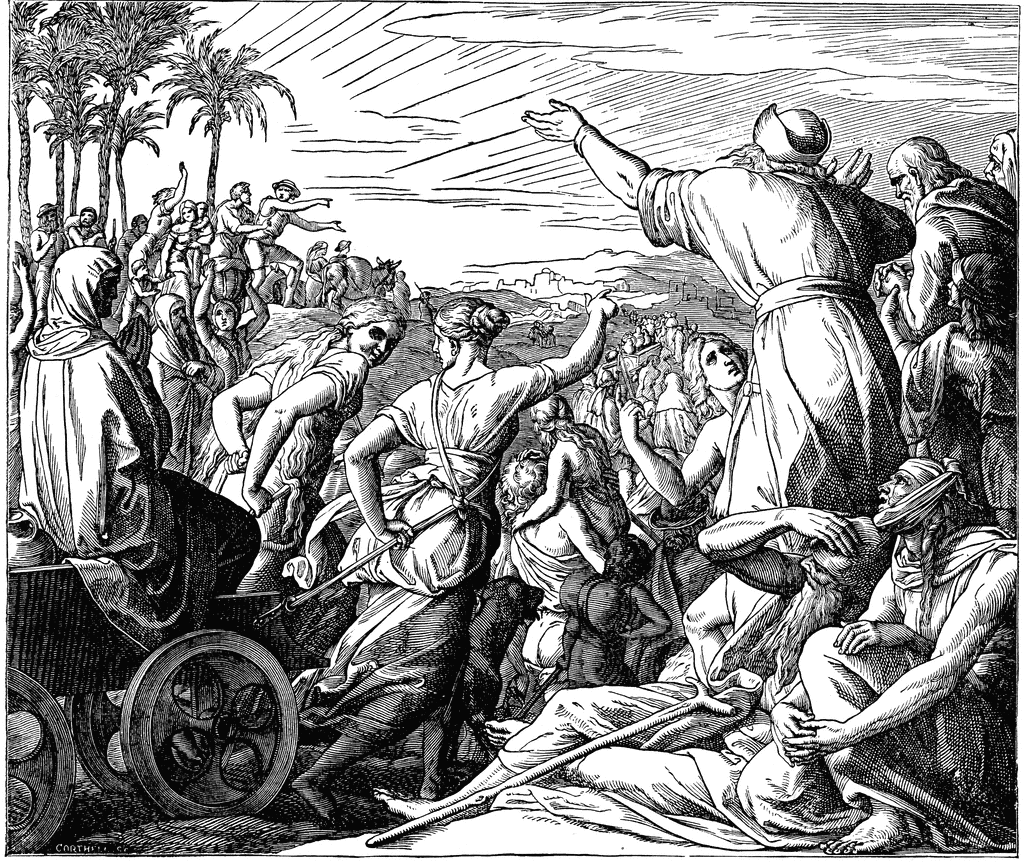- Session 1 - The Return Home (Ezra 1:1–4:24)
- Session 2 - The Temple Restored (Ezra 5:1–6:22)
- Session 3 - Ezra Arrives (Ezra 7:1–8:36)
- Session 4 - A Community Crisis (Ezra 9:1–10:44)
- Session 5 - Nehemiah Arrives (Nehemiah 1:1–2:20)
- Session 6 - The Wall Rebuilt (Nehemiah 3:1–7:3)
- Session 7 - The People Renewed (Nehemiah 7:4–10:39)
- Session 8 - The Community Restored (Nehemiah 11:1–13:31)
During our first session, we discussed Judah's return to the land (Ezra 1:1–4:24). Below is a recording of our discussion and the passage we discussed.
Ezra 1:1–4:24 [New Revised Standard Version]
In the first year of King Cyrus of Persia, in order that the word of the Lord by the mouth of Jeremiah might be accomplished, the Lord stirred up the spirit of King Cyrus of Persia so that he sent a herald throughout all his kingdom, and also in a written edict declared: “Thus says King Cyrus of Persia: The Lord, the God of heaven, has given me all the kingdoms of the earth, and he has charged me to build him a house at Jerusalem in Judah. Any of those among you who are of his people—may their God be with them! —are now permitted to go up to Jerusalem in Judah, and rebuild the house of the Lord, the God of Israel—he is the God who is in Jerusalem; and let all survivors, in whatever place they reside, be assisted by the people of their place with silver and gold, with goods and with animals, besides freewill offerings for the house of God in Jerusalem.”
The heads of the families of Judah and Benjamin, and the priests and the Levites—everyone whose spirit God had stirred—got ready to go up and rebuild the house of the Lord in Jerusalem. All their neighbors aided them with silver vessels, with gold, with goods, with animals, and with valuable gifts, besides all that was freely offered. King Cyrus himself brought out the vessels of the house of the Lord that Nebuchadnezzar had carried away from Jerusalem and placed in the house of his gods. King Cyrus of Persia had them released into the charge of Mithredath the treasurer, who counted them out to Sheshbazzar the prince of Judah. And this was the inventory: gold basins, thirty; silver basins, one thousand; knives, twenty-nine; gold bowls, thirty; other silver bowls, four hundred ten; other vessels, one thousand; the total of the gold and silver vessels was five thousand four hundred. All these Sheshbazzar brought up, when the exiles were brought up from Babylonia to Jerusalem.
Now these were the people of the province who came from those captive exiles whom King Nebuchadnezzar of Babylon had carried captive to Babylonia; they returned to Jerusalem and Judah, all to their own towns. They came with Zerubbabel, Jeshua, Nehemiah, Seraiah, Reelaiah, Mordecai, Bilshan, Mispar, Bigvai, Rehum, and Baanah. The number of the Israelite people: the descendants of Parosh, two thousand one hundred seventy-two. Of Shephatiah, three hundred seventy-two. Of Arah, seven hundred seventy-five. Of Pahath-moab, namely the descendants of Jeshua and Joab, two thousand eight hundred twelve. Of Elam, one thousand two hundred fifty-four. Of Zattu, nine hundred forty-five. Of Zaccai, seven hundred sixty. Of Bani, six hundred forty-two. Of Bebai, six hundred twenty-three. Of Azgad, one thousand two hundred twenty-two. Of Adonikam, six hundred sixty-six. Of Bigvai, two thousand fifty-six. Of Adin, four hundred fifty-four. Of Ater, namely of Hezekiah, ninety-eight. Of Bezai, three hundred twenty-three. Of Jorah, one hundred twelve. Of Hashum, two hundred twenty-three. Of Gibbar, ninety-five. Of Bethlehem, one hundred twenty-three. The people of Netophah, fifty-six. Of Anathoth, one hundred twenty-eight. The descendants of Azmaveth, forty-two. Of Kiriatharim, Chephirah, and Beeroth, seven hundred forty-three. Of Ramah and Geba, six hundred twenty-one. The people of Michmas, one hundred twenty-two. Of Bethel and Ai, two hundred twenty-three. The descendants of Nebo, fifty-two. Of Magbish, one hundred fifty-six. Of the other Elam, one thousand two hundred fifty-four. Of Harim, three hundred twenty. Of Lod, Hadid, and Ono, seven hundred twenty-five. Of Jericho, three hundred forty-five. Of Senaah, three thousand six hundred thirty.
The priests: the descendants of Jedaiah, of the house of Jeshua, nine hundred seventy-three. Of Immer, one thousand fifty-two. Of Pashhur, one thousand two hundred forty-seven. Of Harim, one thousand seventeen. The Levites: the descendants of Jeshua and Kadmiel, of the descendants of Hodaviah, seventy-four. The singers: the descendants of Asaph, one hundred twenty-eight. The descendants of the gatekeepers: of Shallum, of Ater, of Talmon, of Akkub, of Hatita, and of Shobai, in all one hundred thirty-nine. The temple servants: the descendants of Ziha, Hasupha, Tabbaoth, Keros, Siaha, Padon, Lebanah, Hagabah, Akkub, Hagab, Shamlai, Hanan, Giddel, Gahar, Reaiah, Rezin, Nekoda, Gazzam, Uzza, Paseah, Besai, Asnah, Meunim, Nephisim, Bakbuk, Hakupha, Harhur, Bazluth, Mehida, Harsha, Barkos, Sisera, Temah, Neziah, and Hatipha. The descendants of Solomon’s servants: Sotai, Hassophereth, Peruda, Jaalah, Darkon, Giddel, Shephatiah, Hattil, Pochereth-hazzebaim, and Ami. All the temple servants and the descendants of Solomon’s servants were three hundred ninety-two. The following were those who came up from Tel-melah, Tel-harsha, Cherub, Addan, and Immer, though they could not prove their families or their descent, whether they belonged to Israel: the descendants of Delaiah, Tobiah, and Nekoda, six hundred fifty-two. Also, of the descendants of the priests: the descendants of Habaiah, Hakkoz, and Barzillai (who had married one of the daughters of Barzillai the Gileadite, and was called by their name). These looked for their entries in the genealogical records, but they were not found there, and so they were excluded from the priesthood as unclean; the governor told them that they were not to partake of the most holy food, until there should be a priest to consult Urim and Thummim.
The whole assembly together was forty-two thousand three hundred sixty, besides their male and female servants, of whom there were seven thousand three hundred thirty-seven; and they had two hundred male and female singers. They had seven hundred thirty-six horses, two hundred forty-five mules, four hundred thirty-five camels, and six thousand seven hundred twenty donkeys. As soon as they came to the house of the Lord in Jerusalem, some of the heads of families made freewill offerings for the house of God, to erect it on its site. According to their resources they gave to the building fund sixty-one thousand darics of gold, five thousand minas of silver, and one hundred priestly robes. The priests, the Levites, and some of the people lived in Jerusalem and its vicinity; and the singers, the gatekeepers, and the temple servants lived in their towns, and all Israel in their towns.
When the seventh month came, and the Israelites were in the towns, the people gathered together in Jerusalem. Then Jeshua son of Jozadak, with his fellow priests, and Zerubbabel son of Shealtiel with his kin set out to build the altar of the God of Israel, to offer burnt offerings on it, as prescribed in the law of Moses the man of God. They set up the altar on its foundation, because they were in dread of the neighboring peoples, and they offered burnt offerings upon it to the Lord, morning and evening. And they kept the festival of booths, as prescribed, and offered the daily burnt offerings by number according to the ordinance, as required for each day, and after that the regular burnt offerings, the offerings at the new moon and at all the sacred festivals of the Lord, and the offerings of everyone who made a freewill offering to the Lord. From the first day of the seventh month they began to offer burnt offerings to the Lord. But the foundation of the temple of the Lord was not yet laid. So they gave money to the masons and the carpenters, and food, drink, and oil to the Sidonians and the Tyrians to bring cedar trees from Lebanon to the sea, to Joppa, according to the grant that they had from King Cyrus of Persia.
In the second year after their arrival at the house of God at Jerusalem, in the second month, Zerubbabel son of Shealtiel and Jeshua son of Jozadak made a beginning, together with the rest of their people, the priests and the Levites and all who had come to Jerusalem from the captivity. They appointed the Levites, from twenty years old and upward, to have the oversight of the work on the house of the Lord. And Jeshua with his sons and his kin, and Kadmiel and his sons, Binnui and Hodaviah along with the sons of Henadad, the Levites, their sons and kin, together took charge of the workers in the house of God. When the builders laid the foundation of the temple of the Lord, the priests in their vestments were stationed to praise the Lord with trumpets, and the Levites, the sons of Asaph, with cymbals, according to the directions of King David of Israel; and they sang responsively, praising and giving thanks to the Lord, “For he is good, for his steadfast love endures forever toward Israel.” And all the people responded with a great shout when they praised the Lord, because the foundation of the house of the Lord was laid. But many of the priests and Levites and heads of families, old people who had seen the first house on its foundations, wept with a loud voice when they saw this house, though many shouted aloud for joy, so that the people could not distinguish the sound of the joyful shout from the sound of the people’s weeping, for the people shouted so loudly that the sound was heard far away.
When the adversaries of Judah and Benjamin heard that the returned exiles were building a temple to the Lord, the God of Israel, they approached Zerubbabel and the heads of families and said to them, “Let us build with you, for we worship your God as you do, and we have been sacrificing to him ever since the days of King Esar-haddon of Assyria who brought us here.” But Zerubbabel, Jeshua, and the rest of the heads of families in Israel said to them, “You shall have no part with us in building a house to our God; but we alone will build to the Lord, the God of Israel, as King Cyrus of Persia has commanded us.” Then the people of the land discouraged the people of Judah, and made them afraid to build, and they bribed officials to frustrate their plan throughout the reign of King Cyrus of Persia and until the reign of King Darius of Persia.
In the reign of Ahasuerus, in his accession year, they wrote an accusation against the inhabitants of Judah and Jerusalem. And in the days of Artaxerxes, Bishlam and Mithredath and Tabeel and the rest of their associates wrote to King Artaxerxes of Persia; the letter was written in Aramaic and translated. Rehum the royal deputy and Shimshai the scribe wrote a letter against Jerusalem to King Artaxerxes as follows (then Rehum the royal deputy, Shimshai the scribe, and the rest of their associates, the judges, the envoys, the officials, the Persians, the people of Erech, the Babylonians, the people of Susa, that is, the Elamites, and the rest of the nations whom the great and noble Osnappar deported and settled in the cities of Samaria and in the rest of the province Beyond the River wrote—and now this is a copy of the letter that they sent): “To King Artaxerxes: Your servants, the people of the province Beyond the River, send greeting. And now may it be known to the king that the Jews who came up from you to us have gone to Jerusalem. They are rebuilding that rebellious and wicked city; they are finishing the walls and repairing the foundations. Now may it be known to the king that, if this city is rebuilt and the walls finished, they will not pay tribute, custom, or toll, and the royal revenue will be reduced. Now because we share the salt of the palace and it is not fitting for us to witness the king’s dishonor, therefore we send and inform the king, so that a search may be made in the annals of your ancestors. You will discover in the annals that this is a rebellious city, hurtful to kings and provinces, and that sedition was stirred up in it from long ago. On that account this city was laid waste. We make known to the king that, if this city is rebuilt and its walls finished, you will then have no possession in the province Beyond the River.”
The king sent an answer: “To Rehum the royal deputy and Shimshai the scribe and the rest of their associates who live in Samaria and in the rest of the province Beyond the River, greeting. And now the letter that you sent to us has been read in translation before me. So I made a decree, and someone searched and discovered that this city has risen against kings from long ago, and that rebellion and sedition have been made in it. Jerusalem has had mighty kings who ruled over the whole province Beyond the River, to whom tribute, custom, and toll were paid. Therefore issue an order that these people be made to cease, and that this city not be rebuilt, until I make a decree. Moreover, take care not to be slack in this matter; why should damage grow to the hurt of the king?” Then when the copy of King Artaxerxes’ letter was read before Rehum and the scribe Shimshai and their associates, they hurried to the Jews in Jerusalem and by force and power made them cease. At that time the work on the house of God in Jerusalem stopped and was discontinued until the second year of the reign of King Darius of Persia.







No comments:
Post a Comment